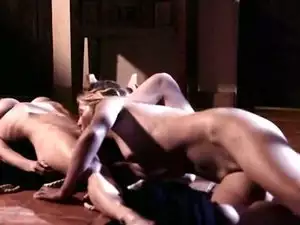A Well-Lived Life 2 - Book 10 - BridgetChapter 100: A Full Circle free porn video

August 17, 1997, Chicago, Illinois
We finished lunch and Marissa and the younger kids went to play, but Natalie sat with the adults to talk, with coffee, tea, or soft drinks. The Sarcus were very comfortable, but the Heaths were still struggling. But, vitally, they hadn’t left and hadn’t insisted Natalie leave the group.
“Can you explain how you developed this attitude and approach?” Chris asked.
I nodded, “It started when I was just a bit younger than Natalie. My mom was a total control freak and I spent five years fighting for moral agency and bodily autonomy. I resolved to never, ever impose the kind of straitjacket on my kids that she tried to impose on me. Kara grew up in a similarly rigid household, though it was her dad, not her mom, who was the one who tried to impose his will on her.”
“You really think parents should have no control over their kids’ lives?” Elaine asked.
“That is not even remotely what I said! It’s how the control is exercised. I’ve used an example before of the Grand Canyon. The view is amazing, but it’s also dangerous if you get too close to the edge. There are any number of options to keep people safe. One is to build a twenty-foot wall with slick sides that can’t possibly be scaled. That gives one hundred percent safety. But it has a problem - you can no longer see the breathtaking view.
“On the other hand, you could simply run a rope on short posts just far enough back to prevent anyone from accidentally falling in, and explain the danger of crossing the rope. It doesn’t detract from the view in any way, because if you stand at the rope, it’s out of your field of view. It provides a guideline for safety, while preserving the view. That’s my approach to parenting. Most parents try the wall.
“But you see, kids are curious and are WAY smarter than you think they are. The wall will have a weakness and they’ll find it. Maybe they just walk around it. Maybe they dig under it. Maybe there’s some kind of maintenance access and they use that. Heck, maybe they just get a twenty-five-foot ladder. And I’m telling you here and now, if you think you can outsmart your kids, you are wrong. Realizing you can’t puts you in a much better position to help them grow up and become productive citizens.
“If you think I’m wrong, you’re going to have to explain how evangelical kids end up with unintended pregnancies, how kids under 21 get access to alcohol, how anyone gets access to illegal drugs, how kids go joyriding in cars, or any of a host of other things their parents have forbidden. And if you think hiding the car keys or the keys to the liquor cabinet will work, you’re wrong. I guarantee you can’t even keep your kids from watching a TV show you don’t want them to watch or from reading a book you don’t want them to read. They WILL find a way.”
“I take it you did?” Elaine asked.
I chuckled, “And then some. My mom was a stay-at-home mom, but I had a bike, and I had friends whose parents both worked. At one point, I had a job that gave me access to a studio apartment when I wanted to use it. I went to Sweden for a year! When I came to Chicago, I got my own apartment, then bought the house. My mom forbade all of those things, by the way. Guess how well that worked out for her?”
“I’d say it didn’t work out well at all, from her perspective.”
“Exactly,” I said. “But what I learned through the years, and with quite a bit of heartache, was that the real issue was that I wanted to make my own decisions and control my own destiny. My mom actually forbade me to marry pretty much any girl I actually liked, including Kara. Again, you can see how well that worked. As I’ve heard said before, the surest way to get a teenager to do ANYTHING is to forbid them from doing it!
“I made a lot of mistakes, some of them pretty big, but through those mistakes I learned how to run my own life. I earned good grades in High School, ran a successful business, and had great friends. But all my mom could see was that I was a disobedient little boy who had no business trying to run his own life. Even after I came to Chicago and graduated summa cum laude and started my own successful business, my mom STILL thought I was incapable of running my own life and shouldn’t be allowed to.”
“That’s crazy!” Chris declared, shaking his head.
“Of course it is. But guess what? Society is moving in that direction. As a society, we’ve decided that teenagers are children, not young adults, and we’re treating them like infants. I hope you’ll excuse me saying this, but you were about to do that when I stopped you earlier. Natalie is not an infant. She’s an intelligent young woman with her own ideas, own desires, and her own plans. You wouldn’t stand for me telling YOU exactly how to live your life; why should she stand for you doing that?”
“But aren’t you doing that now?” Elaine asked.
“Telling you? No. Trying to persuade you? Yes. There’s a world of difference between those two things.”
“What was the catalyst, if I can ask?”
“A Swedish exchange student named Birgit. My eldest daughter is named for her. That’s the Swedish version of Bridget, by the way, which is Natalie’s middle name by strange coincidence. Except I don’t believe in coincidences. I think the universe is well-ordered, even though it appears chaotic.”
“What happened to her?” Mary asked.
“The story started on the very first day of eighth grade when she sat behind me in homeroom. It was, to say the least, a story of unrequited love from then until the end of the school year. Just before she went home, we became a couple. We planned for me to go to Sweden as an exchange student about two years later, but a year after she went home, she died in a boating accident, and all our dreams and plans were dashed.”
“How old was she?”
“We were both fifteen when she died. And as bizarre as it sounds, we had planned our future together. And by that, I mean marriage, kids, and grandkids. Of course, my mom decided I couldn’t possibly know what love was and couldn’t possibly feel the way I did about her, and when Birgit died, my mom tried to prevent me from mourning and tried to prevent my friends from helping me.”
“Your mom sounds like an evil witch,” Elaine observed.
“Those are the exact words Birgit, the second one, has used about her grandmother. And remember what I said about respect being mutual. My mom has zero respect for me or my kids, so I don’t demand my kids respect her. They just ignore her, which, in my opinion, is the best way to deal with people who attempt to impose their will on you, or act evilly. Remember, the opposite of love isn’t hate, it’s indifference.”
“You’ve lost me,” Elaine said.
“Love and hate are extreme expressions of the same emotion. Indifference is the lack of that emotion. As I once said to a rival, I didn’t hate him because that would require the expenditure of emotional capital which I didn’t feel was worth wasting on him. Or, to put it in terms that Dale Earnhardt, a NASCAR driver uses - it doesn’t matter if the fans cheer or boo, because it means they care. When they’re quiet, it’s time to retire because they no longer care enough to expend any energy.”
“What about your dad?”
“Up until I was about fifteen, he was simply my mom’s enforcer. Then he started trying to ameliorate some of her worst tendencies, and when he realized I was at a breaking point, supported my request to go to Sweden as an exchange student over my mom’s vociferous objections, and her attempts to sabotage me. When I came home, he was completely on my side, within the limits of the fact that he loved my mom. It took me a long time to come to terms with that, and my sister still hasn’t. But I can’t blame my dad for wanting to keep his marriage together, even if my mom was an evil witch to me and my sister. But not to my brother, by the way, nor to my dad.”
“What was her problem?”
“Loki only knows,” I replied. “I have my suspicions, and my dad has his, but neither of us is confident that we’re right, and there really isn’t a way to prove it.”
“Loki?”
“The Norse god of chaos,” I chuckled. “I have an affinity for him because of the sheer chaos of my life. I spent twenty years struggling with Fate, and I’ve finally wrestled her to the ground and have her pinned. Now, Loki is an ally because randomness and chaos make life fun! It was Fate that was being a complete bitch.”
“You speak as if they’re real,” Paul said.
I smiled, “Call it the personification of forces in the universe. In a sense, and I don’t mean to be blasphemous, but it’s no different from the Christian practice of calling God ‘Father’ or saying that Jesus is God incarnate. I’m not saying those ideas are wrong, mind you, but I am saying that at best those are human constructions which represent great truths. I can’t imagine you believe there is a bearded old guy sitting around in the heavens any more than you believe Jupiter or Zeus are there.”
“I think our priest might have something to say about that,” Chris said with a wry smile.
“I’m more than happy to explain why I believe he’s wrong,” I chuckled. “But notice, I didn’t SAY you were wrong. There are truths behind all of those teachings. When we make the human construction into ‘the Truth’, with a capital ‘T’, THAT is true blasphemy. And before you ask, I was raised Roman Catholic, but left the church over the same basic issue as your niece.”
“Natalie?” Elaine asked, sounding concerned.
“What? She thought she was going to die and wanted to do it before she died! She and I talked about it even before Aunt Meg found out. And she wouldn’t be upset that I asked Steve what he thought about it.”
“What DO you think about that, Steve?” Elaine asked.
“That I have no opinion, and that if I did, it wouldn’t matter. Nor would Natalie’s opinion. Nor your sister’s opinion. Nor yours. Nor any church’s. The only opinion that matters is your niece’s! Period. She has a deadly disease, for Loki’s sake, and there’s a good chance she’ll die. Do you REALLY believe that wanting to experience sex is going to send her to hell? And if it does, explain to me how such a god could be someone I’d care to worship!”
“Mom,” Natalie said, “do you agree with Aunt Meg that people who don’t believe in God can’t know the difference between right and wrong?”
“That’s kind of a difficult question.”
“Mr. Adams said those are the best kind, because they make us think!”
“Mr. Adams is likely to be on the receiving end of a cup of hemlock, too!” Chris said with a friendly smile.
“You do realize that teenagers, and even younger kids, are naturally subversive, right?” I asked.
“I’m starting to realize that,” he replied. “And you think it’s fun to encourage them!”
“I think it’s VITAL that we encourage them! I question authority at every turn. Just because someone is in charge doesn’t make them right! While it’s not a direct quote, this summarizes the thinking of someone. I’ll tell you the quote, and you tell me when it was said, within say, a hundred years.
“The children now love luxury; they have bad manners, contempt for authority; they show disrespect for elders and love chatter in place of exercise. Children are now tyrants, not the servants of their households. They no longer rise when elders enter the room. They contradict their parents, chatter before company, gobble up dainties at the table, cross their legs, and tyrannize their teachers.“
“That sounds like the sixties,” Chris said.
“I have to agree with that,” Elaine said. “Very sixties.”
“It has to be older than that,” Paul said. “But I don’t know how old.”
“Well,” I said, “that quote was written by a student, Kenneth John Freeman, for his Cambridge dissertation which was published in 1907. He never claimed that the passage was a direct quotation of anyone; instead, he said it was his own summary of the complaints directed against young people in ancient times. In other words, nothing has changed! That quote, by the way is often attributed to Socrates or Plato, but as I said, it’s not a direct quote. It does fit the complaint against Socrates that he was corrupting the youth by encouraging them to ask difficult questions. Which, of course, is why Chris mentioned hemlock.
“In my opinion, Socrates had it exactly right, and society had it exactly wrong. And that’s true today. I don’t know if Natalie mentioned it, but I run something we call Rap Sessions with High School Seniors and college kids that is intended to be just as subversive as Socrates was, and to do exactly what we’re doing here - trying to shake adults out of their foolish delusions about their kids and save society from itself.”
“You’re pretty harsh,” Chris said.
“I speak my mind,” I said. “That’s another problem with society - people don’t speak their minds. Part of that is that people are so ill-prepared to hear things they don’t like or with which they disagree. They are also ill-prepared by our alleged ‘education system’ to think critically. Not to mention the frightening trend I’m seeing of declaring some ideas so offensive that ‘Free Speech’ protections don’t apply. That’s insane, by the way, because ‘Free Speech’ protections are meant for things which are very offensive! Nobody needs to protect inoffensive speech!
“The point is, if we can’t, as a society, have these discussions because we’re too fragile to deal with them, we’re doomed. And we’re starting to turn out fragile teenagers who are ill-prepared for life. Our job, as parents, is NOT to protect our kids, but to prepare them to be productive citizens. That, of necessity, means exposing them to ‘dangerous’ or ‘subversive’ ideas and letting them make their own decisions. The most dangerous thing there is in the world is a closed mind.”
“You truly believe that nothing should be hidden?” Elaine asked.
“I think I proved my point earlier. Nicole obviously knows the mechanics, the same as our kids do. The only difference is that we’ve talked to our kids about it. And we’re confident they’ll come to us with questions, and that they’ll make responsible decisions when the time comes.”
“And you’re OK with that?”
“Does it matter?” I chuckled. “Will me being OK or not OK with it make one whit of difference?”
“You clearly don’t think it will.”
“I’m simply acknowledging reality. My mom went out of her way to prevent me from doing things of which she didn’t approve. She failed spectacularly.”
“But you have to teach your kids right from wrong!”
“Of course. But the answers don’t come from some book or on tablets of stone or wherever else you think they might come from. There are some overarching truths, and some solid moral precepts, but do you seriously believe that shirt you’re wearing is sinful? Or the ham and cheese sandwiches the kids had are sinful? Or if Farmer Ted plants two crops in the same field he’s going to hell?”
“Come on! Nobody believes that!”
“Try ordering a cheeseburger in Tel Aviv and get back to me,” I replied.
“Seriously?”
“Jewish dietary law comes from the Old Testament. James tried to enforce it on early Christians, but Peter received a sign saying they no longer applied. And those other things I mentioned are forbidden to Jews in the Old Testament. And I can point to other lists of laws in other books, many of which contradict each other. That said, there are some great moral truths - ‘love your neighbor as yourself’ and ‘do unto others as you would have them do unto you’. It’s pretty damned hard to actually sin if you follow those precepts.”
“You believe in sin? That doesn’t seem to follow.”
“But it does, if you understand sin as it’s actually presented in the Bible - as missing the mark. The terms used are archery terms and they refer to not hitting the center of the target. Or, as has been said, getting up and trying again when you fall down.”
“Do you actually believe in God?”
“I’m agnostic, and have been since High School. I don’t know enough about the universe with enough certainty to say if there is one God, there are many gods, or there are no gods. But evidence suggests the universe is far more complicated than even quantum mechanics implies.”
“And all of that tells you that we should let teenagers do whatever they want to do?”
“All actions have consequences,” I said. “Our job as parents is to teach our children about the consequences and to set very broad limits to contain the fallout when they make bad choices. That is how you learn - you make a mistake, learn from it, and grow and move on. We can only truly learn from adversity. In order to know how to win, you have to know how to lose.”
“‘Participation’ trophies?” Paul asked.
“Pure, unadulterated evil which sends the message that you win even when you lose, but not in a good way. I think you win when you overcome the loss, not when you’re rewarded for losing to assuage your self-esteem. But if you get rewarded for nothing, do you REALLY have self-esteem?”
“It wouldn’t seem so,” he replied.
Natalie looked at me and we made eye contact.
“Natalie, do you have something you want to say?” I asked.
She nodded, “Mom, do you think I’m a good kid?”
“Yes.”
“And you’ve said I’ve made good decisions?”
“Yes, of course.”
“Then why don’t you trust me to make my own decisions about my life?”
“We’re trying to keep you safe,” Elaine said. “But you’re going to say you agree with Mr. Adams about that.”
- 08.09.2021
- 42
- 0




























































